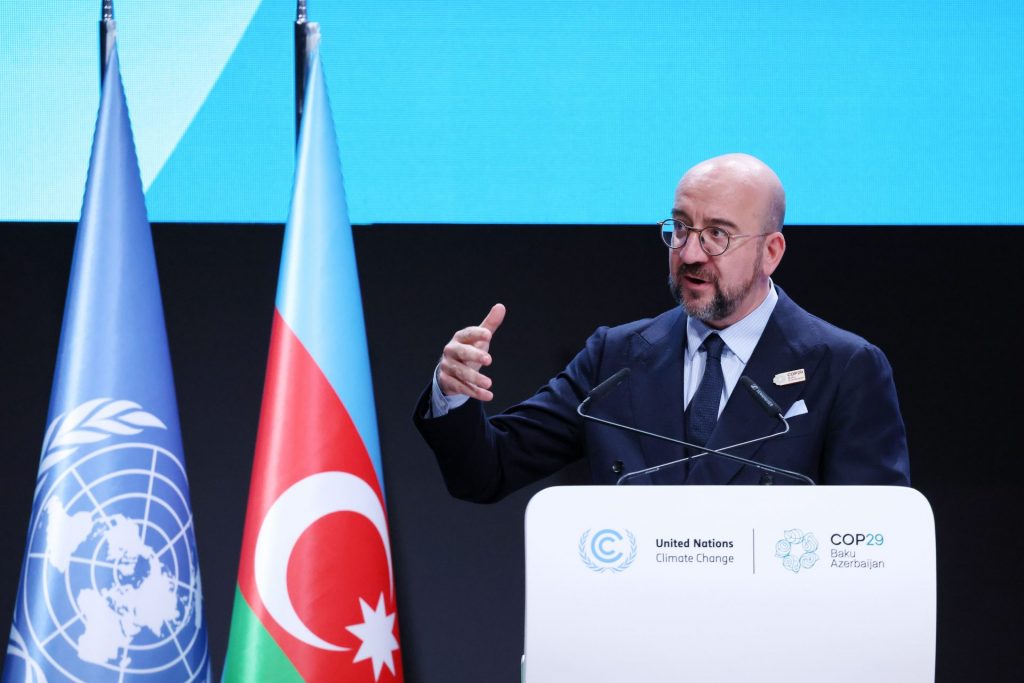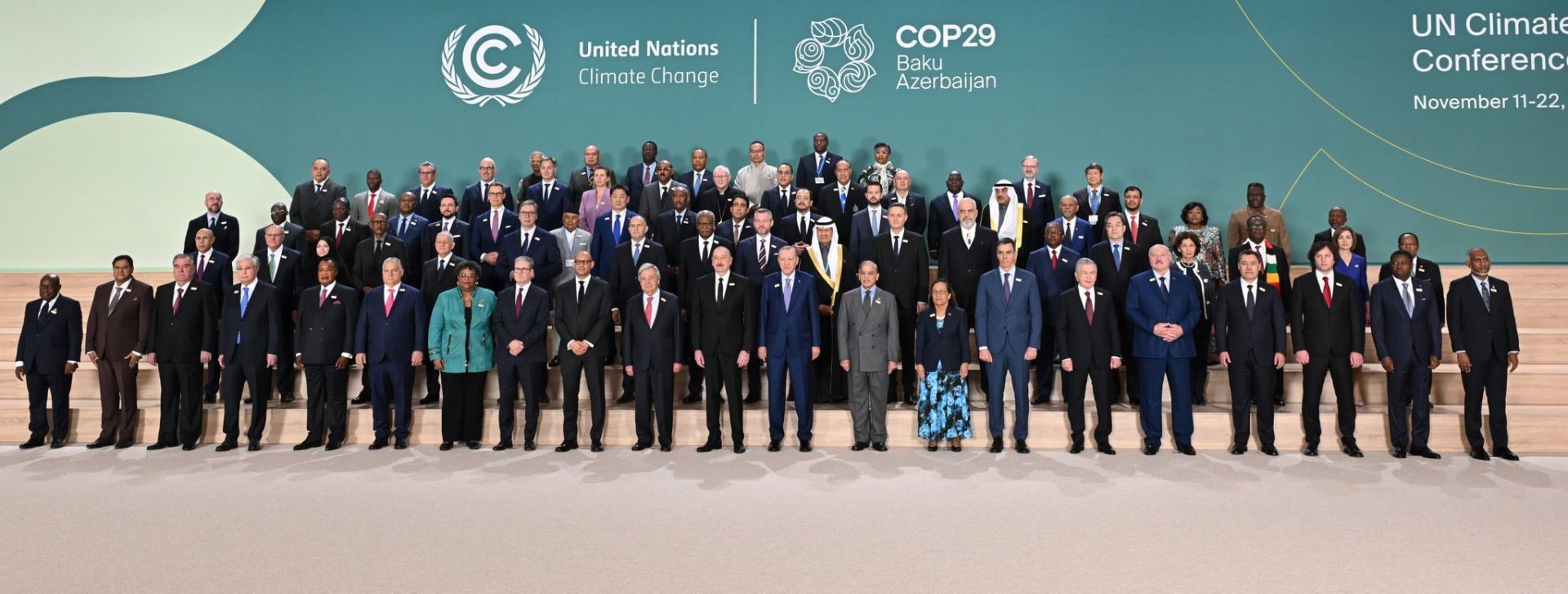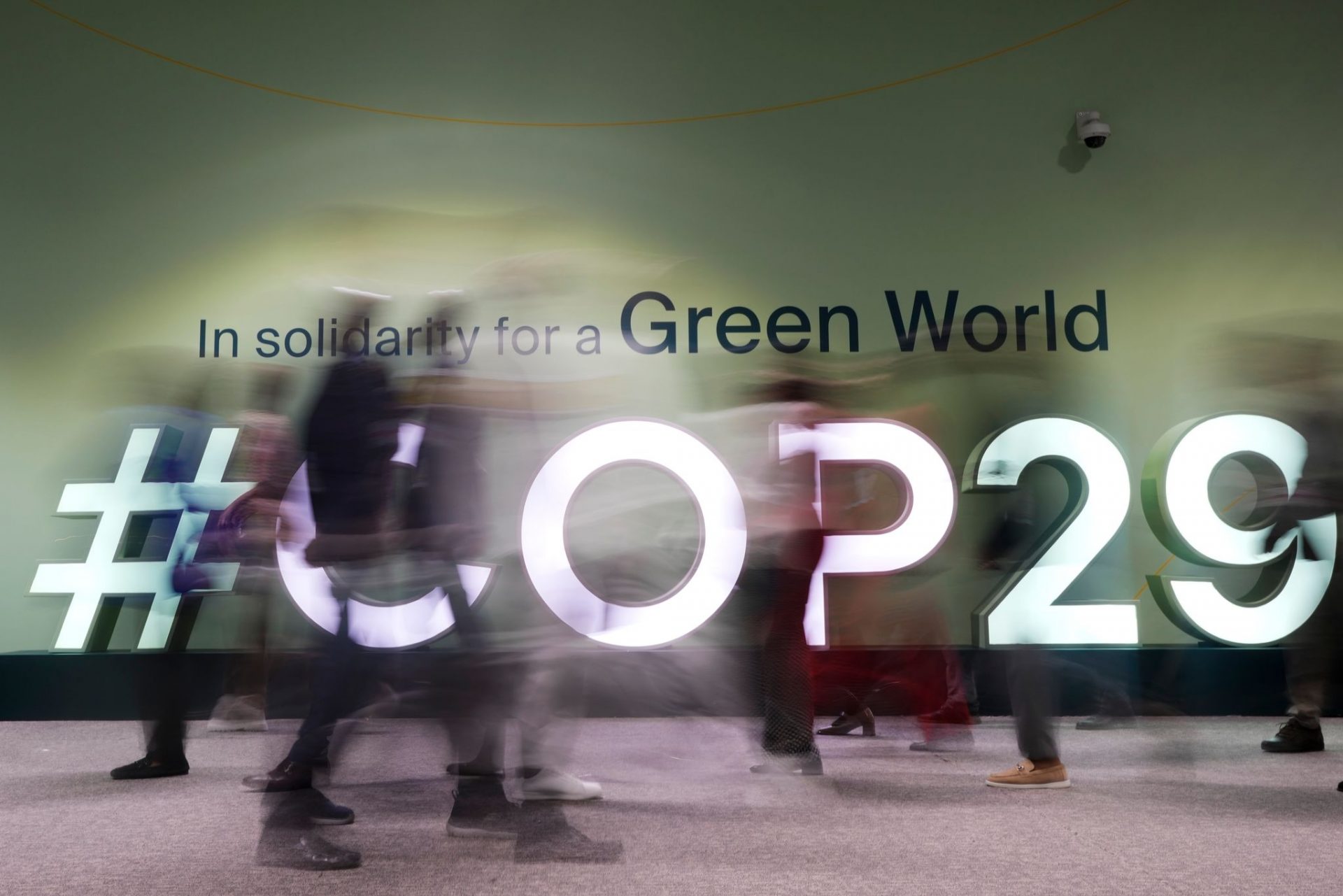 Have the article read by OpenAI (Beta). Please note that AI translations may take some time to process.
Have the article read by OpenAI (Beta). Please note that AI translations may take some time to process.A coalition of leaders from industrialised nations and climate-vulnerable countries called for more ambitious climate funding on Wednesday at the United Nations Climate Change Conference (COP29) in Baku, Azerbaijan.
The UN says 2024 is about to surpass the climate restriction of temperatures not being 1.5 degrees Celsius hotter than the pre-industrial average limit, although this does not amount to an immediate breach of the target, which measures temperatures over decades.
“The sound you hear is the ticking clock. We are in the final countdown to limit global temperature rise to 1.5 degrees Celsius. And time is not on our side. Unless emissions plummet and adaptation soars, every economy will face far greater fury.”
António Guterres, Secretary-General of the United Nations
At the summit, the creation of a UN-backed global carbon market has taken a step closer to reality with governments approving new standards for the use of tradable credits to meet climate targets, similar to the European Union’s Emissions Trading System (ETS). The agreement was hailed as a breakthrough after nearly a decade of complex negotiations over the rules for trading carbon credits.
However, world leaders offered competing visions on how to tackle climate change and tough talks regarding climate funding ensued.
Meanwhile, the conference was overshadowed by the re-election of the Republican Donald Trump as president of the United States, who had previously said he would cancel the US’ commitments to reduce carbon emissions. The former US president vowed to again pull the country out of the Paris agreement once he is taking over the presidency in January 2025.
Stark warnings on emissions
Planet-warming carbon dioxide emissions from oil, gas and coal rose to record highs this year, according to preliminary research from an international network of scientists at the Global Carbon Project – published just as leaders gathered in Baku.
The research found that to meet the Paris agreement’s ambitious goal of limiting warming to 1.5 degrees Celsius, the world now needs to reach net-zero CO2 emissions by the late 2030s – instead of 2050.
Researchers said increases in CO2 emissions from India as well as growth in international aviation drove emissions up, while emissions decreased in the European Union and the United States.
This year is “virtually certain” to be the hottest in recorded history with warming above 1.5 degrees Celsius, the EU’s Copernicus Climate Change Service said last week. It said the world was passing a “new milestone” of temperature records that should be a call to accelerate action at the UN negotiations to cut planet-heating emissions.
The European Commissioner for Innovation, Research, Culture, Education and Youth, Iliana Ivanova, reported that a six-fold acceleration of the decarbonisation of economies is needed to meet climate targets. She added that 35 percent of the funding for the Horizon Europe initiative, which totals 93 billion Euro over seven years, is earmarked for climate research.
Push for more climate funding
A small group of developed countries that are currently contributing to help poor nations adapt to climate change want other rich countries and major polluters, including China and the Gulf countries, to join them. According to 30-year-old UN logic, China and the Gulf states are considered developing countries – and are therefore recipients of climate aid.
As leaders spoke, negotiators released a fresh draft deal on finance that includes a raft of options to raise funding – but leaves unresolved sticking points that have long delayed an agreement.
Most developing countries favour an annual commitment from wealthy countries of at least 1.3 trillion Dollars. This figure is more than ten times the 100 billion Dollars annually that a small pool of developed countries – among them the US, the EU and Japan – currently pay.

Speaking on behalf of the European Union, European Council President Charles Michel insisted on broadening the range of donors to climate finance, including emerging countries such as China.
The Prime Minister of the Caribbean island Barbados, Mia Mottley, whose country risks ending up under water, called for taxes on fossil fuels, maritime transport and aviation to finance climate policies.
Croatian Prime Minister Andrej Plenković said countries that have been industrialised longer should help financially to ensure that emerging economies do not emit as much greenhouse gases as they otherwise would. He referred to this year’s aim to increase the present amount of 100 billion Dollars that developed countries allocate for developing countries’ climate transition.
“The ambition now is to roughly double that amount so that the allocations that developed countries can make to the fund for less developed countries would contribute to the transition from fossil fuels to renewable energy sources,” Plenković said.
Danish Prime Minister Mette Frederiksen emphasised that private capital is needed if developing countries are to receive sufficient aid. At the summit, Denmark provided a concrete example of how Western public money can grow into larger private sums. By providing a 700 million Danish Krone (DKK) guarantee, Denmark will secure private investments totalling over DKK three billion (400 million Euro) in Asian developing countries.
Germany has pledged six billion Euro (6.4 billion Dollars) annually for climate financing starting next year. However, previous budget plans revealed a shortfall in the allocation of these funds and climate activists warn Germany risks losing credibility if it fails to meet commitments.
The President of North Macedonia, Gordana Siljanovska Davkova, said that the “sustainable energy transition must be environmentally and socially just”. She highlighted that countries should have permanent access to climate action funds prior to their EU membership, referring to funds needed to implement EU climate laws as part of the challenging “Green Agenda and Sustainable Connectivity” cluster in the EU accession negotiations.
North Macedonia became an EU candidate country in December 2005. Accession negotiations opened in July 2022.

World leaders divided on climate action
Some leaders in Baku defended fossil fuels during the two days of speeches, while others from countries plagued by climate disasters warned that they were running out of time.
Azerbaijan’s President Ilham Aliyev, whose energy-rich country is hosting the COP29 climate talks, repeated his insistence that oil, gas and other natural resources are a “gift of God”.
Tuvalu’s Prime Minister Feleti Penitala Teo insisted that for Pacific island nations like his, “there is simply no time to waste”. He urged countries to “deliver a clear signal that the world is promptly phasing out fossil fuel”.
The Prime Minister of Spain, Pedro Sánchez, highlighted the example of the tragedy in Valencia due to the recent floods to appeal to the conscience of the international community so that it reacts to the evidence that “climate change kills”, urging it to stop “dragging its feet” and fight the deniers. He recalled that the floods caused 222 fatalities.
Some of the strongest words during the summit came from Albanian Prime Minister Edi Rama, who complained that “our speeches full of good words about climate change, change nothing”. Rama skewered the many leaders who skipped this year’s event, saying their absences added “insult to injury”.
Slovenia’s chief climate negotiator at COP29, Tina Kobilšek, warned that “the window for achieving the 1.5 degrees Celsius target of the Paris Agreement is closing rapidly”, according to the latest findings of experts on greenhouse gas emissions around the globe. “We know that this year is likely to be the warmest on record and that Slovenia is warming twice as fast,” she said, adding that all alarm bells should be ringing.
Serbian President Aleksandar Vučić called on big powers to ensure peace in the world and, above all, resolve the conflicts in Ukraine and the Middle East, so that the world could tackle the issue of climate change. Addressing the summit in Baku, Vučić said restoring peace was one of the “prerequisites to start tackling the issue of fighting climate change”.
According to the President of the Slovak Republic, Peter Pellegrini, the longer we wait with the fight against climate change, the more we might lose in terms of our lifestyle, ecosystem and economy. He pointed out that Slovakia’s emissions have dropped almost by 50 percent since 1990, with the last coal mine having shut down in 2023. He added that Slovakia is recalibrating its focus on low-emission forms of energy – particularly nuclear energy and renewable energy sources.
Italian Prime Minister Giorgia Meloni, meanwhile, urged a “realistic global outlook” that did not prioritise decarbonisation over “our production and social system’s sustainability”. The right-wing leader added that “we must protect nature, with man at its core. An approach that is too ideological and not pragmatic on this matter risks taking us off the road to success”.
The UN Climate Change Conference rotates annually between the world’s regions. Next year, Belém in Brazil will host COP30 on behalf of the Latin America and Caribbean region.
This article is published twice a week. The content is based on news by agencies participating in the enr.
